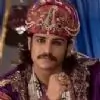JOURNEY FROM JALLAD TO AKBAR

to

A year ago, we were introduced to the character of Jalalluddin Mohammad, a protege of Bairam Khan, intent on conquering and ruling the whole of Hindustan, looked upon by the people of the nation as an outsider, an invader, as a Jallad, whose name meant a heartless killer to them, hated and cursed by them all.
A year later, (a year and a few months later by serial time) we had an old man from the same people, tottering to him and expressing his wish to call him Akbar, meaning The Great and touched his feet in reverence and looked upon him as one among them, respected and loved by them all.
What a transformation from one extreme to another!
There are two things that have to work in your favour for you to achieve anything,
-Destiny and God's blessings
-Your own hard work and willingness to improve and achieve.
His destiny took a turn in his visit to Amer, as he looked at the desert kingdom, (an attachment he had as he was born in one of these kingdoms), and was pulled towards it though his friend thought it was a dozak. A second turn, when he saw the 'registaan ki gulaab', a princess whose beauty swept him off. Her placing the sword at his neck combined with his pull to her beauty filled him with the urge to possess her. Marry her, he did...against her wishes though. But could not possess her the way he wanted to. She was a challenge, not wanting anything from him and not willing to give him anything either, a novelty and Jalalluddin liked challenges.
In his journey to attain her, he was exposed to a whole new range of emotions. Having wrongly accused her of murder of his unborn child and having pricked her badly in the affair he felt guilt for the first time. In his journey to Ajmer, he saw her pray his way. Having been born and having spent his early years in the kingdom of Umarkot, he was open to other religions too. The fun he had in taunting her and in her sharp responses, he felt was more than the fun at winning a 100 wars. The many experiences they shared together, tested by the plots of the evil people around them, that finally culminated in her lying on the deathbed for him, made him admit to himself and God that he was in love, a feeling that he refused to admit that he could possess.
Alongside, his stability at Agra over the past year brought him closer to his own mother. The betrayal by his sister and brother in law made him feel pain of the acutest kind. The betrayal by his mother-like figure in whom he trusted more than he trusted in himself shattered him and agonised him. The falsety of his father-in-law against the total honesty of his wife, the magnanimity of his half-brother against his anger, the cheating of his childhood friend where it pricked him most, and the patience advocated by his wife to save his friendship were experiences that chiselled the fine personality in him. Nothing teaches like experience and he was a willing student.
In this year he got closer to his populace. He wanted to rule the people, not just the lands. Though he always considered his awaam as his janasheen, his birthday gift of their blessings stirred an unfelt sensation in him and in his desperate attempts to save his wife from death bed he sought their prayers. When she was saved, he got closer to his people. He understood that a king with his powers alone cannot achieve everything. There are things like prayers and God's blessings that are more superior to his sword and that he cannot be the sole writer of his destiny . Though he was never cruel and heartless, except perhaps on the battlefield like any other warrior, this year saw him turn very compassionate to his people. His bottled up goodness burst out and propelled him to challenging laws and making reforms.
The plight of an unwilling young girl being forced into marriage, made him pass laws to abolish child-marriages - he went to the extent of risking his own marriage to establish this law! He spoke for widow remarriage and risked the stone pelting of an angry mob to protect a widow. A tour into the plights of slaves made him abolish slavery. These are steps that even established and experienced kings of the land then, did not attempt to, either they did not care or they did not want to risk revolts.
In an era when Catholics and Protestents were killing each other in the west, even the divides among Hinduism did not find harmony, with Shaivites and Vaishnavites quarrelling, and Raam Bhakts and Krishna Bhakts refusing to see unity, here was a man from another land another religion, another faith, who saw the religion of Hindustan at equal levels as his own, bowed before the Hindu idol and accepted it as its own, inviting the wrath of the maulvis, fought them, prayed to Krishna as he saw his God and that of his wife to be no different, saw injustice in the Hindus being asked to pay tax to pray and wished to be whipped for it, abolished the tax and issued coins featuring images of both the faiths stressing the equality of all religions.
It was this final act of his that made his subjects accept him whole heartedly as their king whom they acknowledged to be Great, who loved them beyond all differences and worked for their welfare, a great king who cared for his subjects , their AKBAR, a name given by them in love, respect and admiration by which the world knew Jalal better, then and even now 5 centuries later.

PS: Kudos to Rajat for his excellent portrayal of Jalalluddin Mohammad Akbar - as a capable shaatir sipahi with a low boiling point to a great king and a very fine human being with unbelievable levels of understanding, tolerance, affection and compassion for all. The actor has excelled in portraying all the shades of this gallant achiever. Can't imagine anyone else who could do so much justice to the character with so much conviction, grace, sincerity and flair.👏👏👏👏👏👏
































30